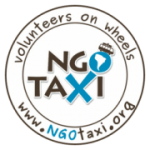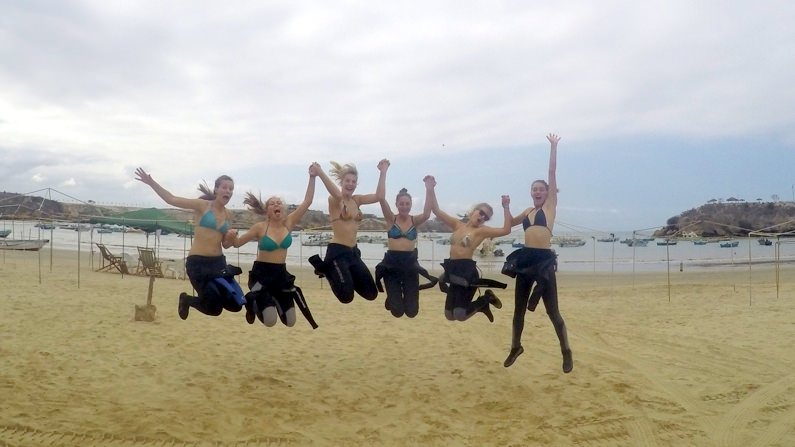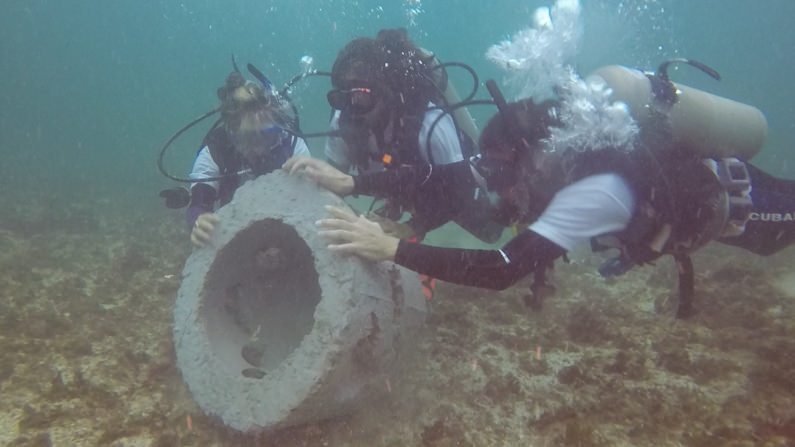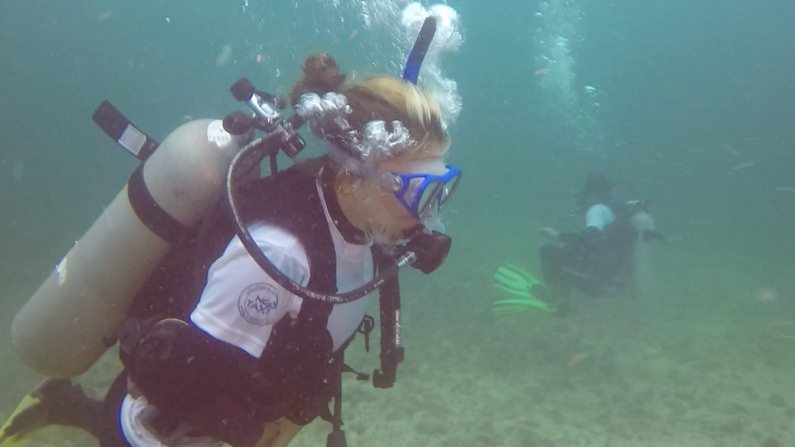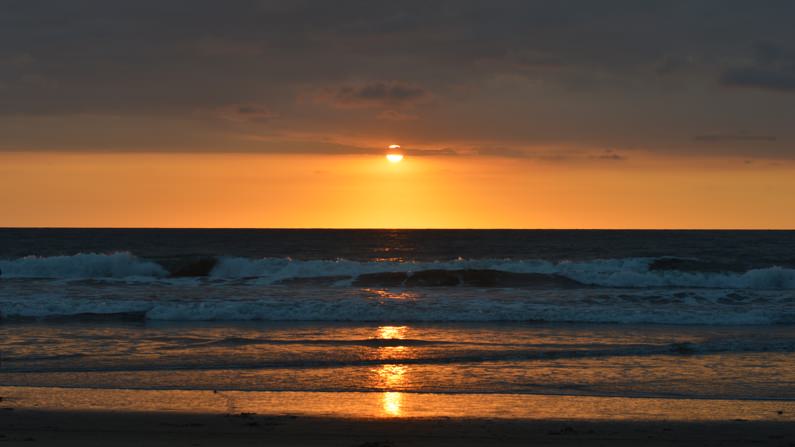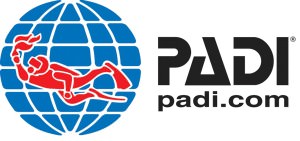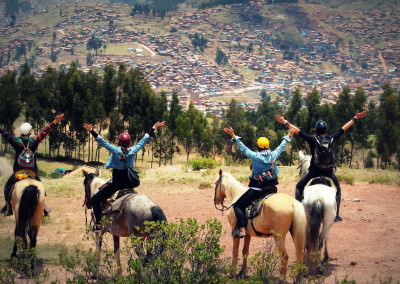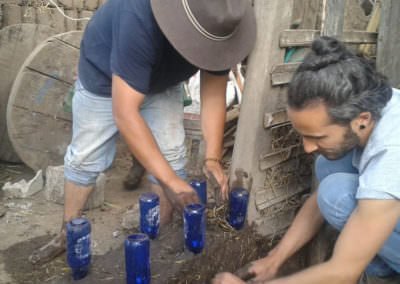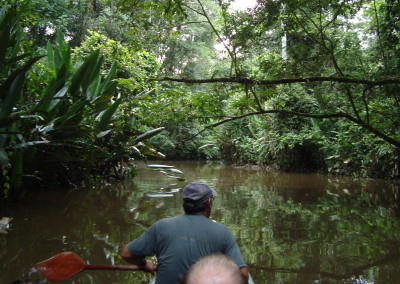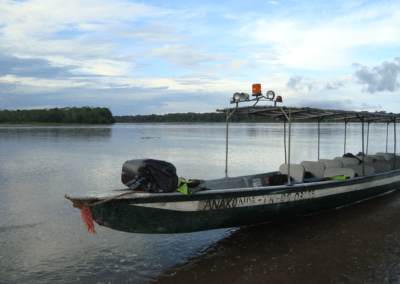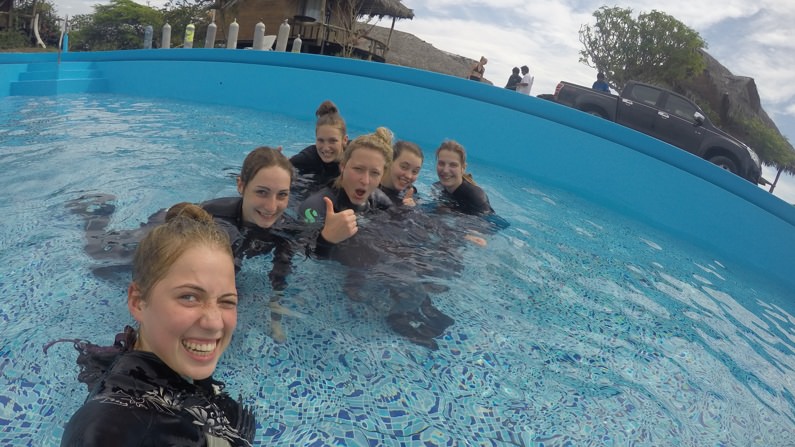
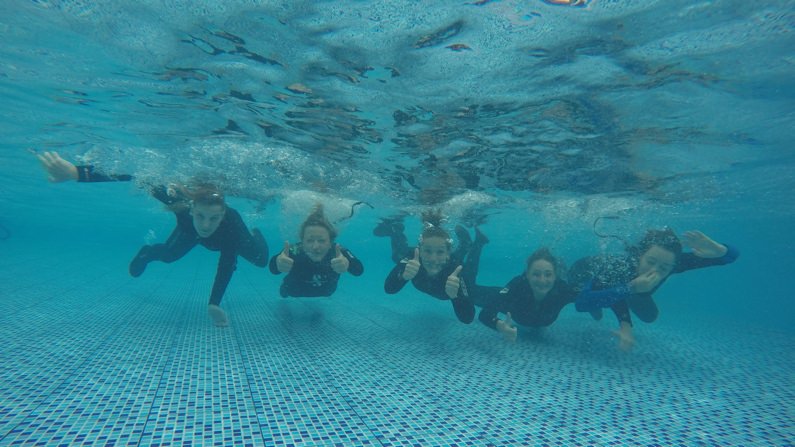
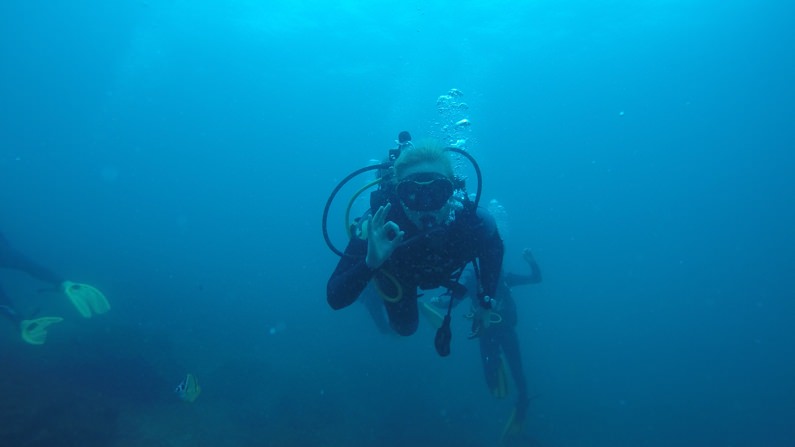
Dive and Volunteer Camp: Marine Biology and Wildlife Conservation (Pacific Coast Ecuador)
Dive into action and join us for underwater reef reforestation!
Did you know that you can also volunteer underwater with us? We are looking for committed volunteers to work on the tropical beaches of the Pacific Ocean and willing divers for reef restoration work in the ocean. The location of your field of service is directly on the equator on the coast of Ecuador, at one of its favorite travel and vacation destinations!
The project aims preserve marine fauna. Furthermore, it’s also having an impact on communities nearby, and especially on the thousands of divers and tourists who visit every year.
DETAILS
Project Description
Problems:
The steady growth of tourism, on the one hand, has brought greater stability and economic development to Ecuador. However, on the other hand, its side effects have sadly resulted in increased pressure upon the delicate and unique plant and animal life throughout this tourist mecca.
One effect of the steady growth of tourism on the coast has been increased traffic on the water (banana boats, diving trips, island tours, fishing boats etc.). Worldwide, endangered sea turtles are threatened with extinction, due to injuries sustained by boat propellers. Their shells are sliced open, meaning they are unable to dive for food and die from starvation. At the same time, nightlife, noise and light are adversely affecting the chances of survival of the next generation as they hatch and find their way to the sea.
Growing numbers of tourists are making their presence felt. Plastic bottles, containers and bags are commonly used, misused, and carelessly disposed of. They are frequently discarded on the beach, swallowed up by the tide and swept out to sea and, subsequently, often washed ashore again.
Without question, all of this not only places in danger the fragile breeding grounds of sea turtles and local birds that need to be protected, but also life under the sea. Plastic that finds its way into the ocean often becomes entangled in fishing nets or is ground into tiny particles that enter the food chain when swallowed by fish. Ultimately, it ends up on our plates.
Overfishing is already decimating threatened species. In many cases, the caught fish never even make it to shore; instead, they are trapped within the many lost nets that float throughout the sea. Although the fish may manage to escape, the nets regularly become ensnared in plastic waste; the nets sink and settle on the coral reef, doing great damage to the ecosystem. Coral reefs continue to recede, a precious habitat that is being destroyed, and with it, the plant and animal life that live there – species hundreds of thousands of years old that existed long before us.
Therefore, we must act!
Additionally, it’s not only the case in Western countries that environmental interests are subject to local political changes; this happens in developing countries as well. For example, a former politician in Ecuador supported a marine conservation project near to the location of this project; however, his successor decided to side with the industrial fishery that was also located in the vicinity, a large-scale sardine operation. This undeniably led to the drastic loss of support for regional environmental programs on the Ecuadorian coast.
Objectives:
The goal of this marine conservation project is to confront a host of current ongoing problems comprehensively and with a long-term approach. For this reason, the project is using an interdisciplinary approach, which is reflected in the wide range of projects that you can get involved in – see below. With your help, our efforts will not simply focus on the symptoms of the problem. Instead, we aim to tackle the root cause and create a strong environmental conscience within the local population that stands the test of time.
Therefore, educational work in the areas of environmental and animal conservation is critical for protecting the sea in ways that are sustainable. This is best accomplished through unified leadership. For this reason, we need groups of volunteers who work well together as a team and can pool their knowledge and ideas in order to attack the problem from different points of view.
“El objectivo es la conservacion del ambiente y repoblacion del océano.”
“The objective is the conservation of the environment and repopulation of the ocean.”
Volunteer Responsibilities
Your prinary responsibility will be carrying out a census of various marine creatures. Beyond that, you’ll be involved in designing and creating new living spaces for endangered species, caring for injured sea turtles, beach cleaning and recycling work and educational leisure activities for tourists (i.e. fundraising by conducting bicycle tours in the vicinity).
If you like, you can specialize in this project and, at the same time, also be involved in ongoing volunteer work underwater! Here you’ll collect materials from the ocean that will subsequently be used in the construction of octopus huts. While safely conducting your dives, you can also help reforest the coral reef on the sea floor, as well as carry out a census of animal species and measurements of the coral reef. All the while, you’ll have the opportunity to see coral sharks, tuna fish, rays, giant sea turtles and, depending on the season, maybe even whales!
The spectrum of work is broad, and may include: researching areas of environmental need; doing educational and conceptual work; planning a workshop; or documenting your colleagues’ accomplishments. Of course, you can also focus primarily on diving, if you’re considering making diving a career.
The following are some areas of the project that you may assist with:
Practical tasks:
- Obtaining material needed for the octopus shelters.
- Building the octopus shelters that will be used in the reef restoration work and that offer natural habit for the cuttlefish.
- According to personal inclination, length of stay, training and project membership, doing dive training, regular boat rides and diving runs in order to:
- Locate octopus huts on the ocean floor.
- Check on octopus huts on the ocean floor.
- Monitor marine species of turtles, coral and other wildlife on and in the vicinity of the newly restored reef.
- Completing the construction of an ocean water pool (it’s already been excavated).
- Building a sea turtle preserve.
- Assisting in the reintegration of sea turtles.
- Assisting in the creation and enforcement of security measures to protect the newly hatched turtles on the beach.
- Regularly helping to keep stretches of the local beach clean during your camp stay.
- Constructing signs to help protect the beaches.
- Participating in recycling.
- Conducting an educational campaign and leisure activities for the local population and tourists (such as educational bike tours, including visits to the aquarium and the marine biology museum to raise money).
- Assisting with workshops for children and adults.
- “Do handstands at the beach stand”, i.e. helping to arouse publicinterest and advertise the importance of protecting the environment at an information booth.
Administrative tasks:
- Doing conceptual work for workshops and education campaigns using pre-prepared videos and instructional materials (i.e. videos and power point presentations).
- Creating advertising materials (fliers, posters, brochures).
- Researching and introducing, according to local standards, a recycling concept for separating trash (in particular plastic bottles).
- Conducting research about topics related to protecting the coast, animals and nature.
- Conducting research and creating instructional and workshop materials to help raise awareness.
- Developing marketing and PR campaigns.
- Writing reports and taking notes of protocol and proceedings at meetings.
- Document management.
The exact tasks you will be asked to carry out will depend on the current needs and priorities of the project as determined by the camp manager and NGO Taxi management. The tasks stated here are therefore examples of some of the possible types of activities you will be asked to do.
Working hours:
Your work day begins at 8am and lasts till 3pm, Mondays through Fridays – during weekends you’re free to explore. For lunch you can satisfy your hunger in a restaurant nearby; afterwards, take a siesta in one of the colorful hammocks in the camp or bask in the sun on the beach and enjoy the gentle sounds of the Pacific waves breaking on the beach – don’t forget the sunscreen!
Location
Your work will take place right on the equator, on Ecuador’s Pacific coast, a favorite travel destination for surfers and divers. On weekends, instead of getting a buzz on with mosquitos, mix it up and get it on with a couple of mojitos – a favorite local rum concoction! Then, rise and shine well-rested. Hop out of bed in our volunteer dorm or your personal bamboo hut, right onto your board… because our Surf & Help Camp is located just a stones throw from the beach!
However, with this project, you’re not bound to one location. Together with other surfers, you can take off and explore pristine coves and bays, idyllic aldeñas and fincas (villages and farms) – all located nearby. Grab a mountain bike and explore the area at your own pace or in a group. Your project leader, an experienced marine biologist, can teach you all about Ecuador’s tropical climate, its history and the unique characteristics of the flora and fauna on South America’s west coast. With this project, you’re guaranteed to learn to appreciate what makes the precious sea and all forms of life, in and around it, so special.
Transportation
The 3-hour journey to and from the airport in Guayaquil to the camp location at the beginning of the project and after its successful completion is included in the program fee. When you work at the rescue and conservation station you will be commuting every day by public bus from your camp to your project site. Public bus fares are not included. However, local buses are inexpensive compared to Western standards (approximately 0.70 US cent for a single ride).
Accommodation and Food
All camp participants can use the self-catering kitchen facilities at campsite. You can go shopping in town, store your groceries in the fridge and either cook on your own if you have special dietary requirements, or cook together with the other camp participants (which certainly is much more fun!). Alternatively, you can go to restaurants nearby, where you can eat cheaply – avoiding the exorbitant prices tourists pay. Our Surf & Help team will tell you exactly where to go. Your accommodation at the camp is equipped as follows:
- Swimming pool.
- Jacuzzi.
- Waterball net.
- Hammocks.
- Volleyball net.
- Gym in town (cost not included).
- Language school nearby. Optional: You can also book your language course in the capital, Quito.
- Communal area with TV and DVD.
- Free Wifi.
Prerequisites
Professional requirements:
You don’t need to have any technical expertise, solely a sincere personal commitment and a love for the ocean and nature. You also don’t need to have any previous diving experience. You can obtain your PADI diving license during your program period. If you want to go on the diving excursions or, if you’re obtaining your diving license or even diving instructor license, then of course you have to be able to swim and meet all the necessary physical and health requirements (a physical examination and certified clearance from your physician are needed for those getting their diving license). It goes without saying that whatever kinds of project-related expertise you may bring to the table, it will be gladly received and certainly put to good use.
This project supports and encourages teamwork along with a great deal of flexibility, autonomy and initiative. If you are open and ready for it, you’ll learn how to deal with various aspects of daily life and be able to adapt to different fields of activity.
Generally, you should be ready to respond to changes and be able to deal with the unexpected for any work in South America.
Language requirements:
Since your deployment takes place on the coast of Ecuador in a tourist area with all the associated infrastructure, you’ll be able to make yourself understood in English, by and large. One of your project leaders speaks fluent English, although the other one doesn’t. Thus, the ability to speak both English and basic Spanish, which you can obtain at the start of camp, is required.
Note: your camp fees already include a free 20-hour intensive Spanish course that will help you prepare for the task at hand and provide you with the specific terminology and vocabulary that you’ll need. This course is however an advanced course. In general, you should be able to speak Spanish at least at conversational level in order to make an impact at the project site. Please ask us and we can get you in contact with one of the local Spanish schools we work with.
You can also go online at home and complete an NGO Taxi Spanish course. You can then continue learning Spanish during the project, either under group or private instruction. NGO Taxi offers the opportunity to do some language preparation courses before arrival using Spanish instructional videos or online group seminars.
Special Intensive Spanish Courses: If you already speak Spanish you can also combine this project with a special intensive Spanish course (group lessons or private instruction e.g. university preparation courses) prior to camp start. If you want to take advantage of this opportunity to improve your Spanish simply let us know when you contact us. We are happy to provide you with all the information about your options.
Additional Information and Specials
Minimum age:
20 years.
Start Dates:
1st or 3rd Sunday each month.
(Individual arrival dates possible, surplus applies).
Length of stay:
Minimum 4 weeks on the mainland in Ecuador (maximum 1 year). If you wish to continue your diving experience on the Galapagos please bear in mind that you can only stay there for up to a maximum of 3 months due to the internal law of the Galapagos Islands.
Immunizations:
Since you’ll be coming into contact with exotic wildlife, it is absolutely necessary that you have current immunizations. This includes, among others: yellow fever (certified), tetanus, typhoid, diphtheria, hepatitis A and B, and rabies. You’ll receive exact information pertaining to immunizations needed in Ecuador, as well as your personal preliminary documentation, following your successful application with us.
You can inquire in advance concerning immunization requirements by consulting medical authorities in your country of origin, e.g. in the US, check with the Centers for Disease Control and Protection. Or contact your family doctor.
http://wwwnc.cdc.gov/travel/destinations/traveler/none/ecuador.
Special conditions:
- During this project you have the option to obtain a professional PADI* diving license (Open Waters (OW) or Advanced Open Waters (AOW) ). You can also specialize in further diving course options, e.g. technical diving. To undertake training to become a diving instructor you’ll need to have already had a medical exam by your family doctor (see requirements).
- Diving equipment is available locally, but if you have your own gear, you’re welcome bring it with you.
- Number of camp participants: The maximum number of camp participants is limited to 10 people.
*PADI – Professional Association of Diving Instructors – is the world’s leading organization of diving instructors. A PADI certified diving license makes it possible for you to rent diving gear and lead diving runs throughout the world.
Included services:
- FREE 5-day certified PADI diving course included!
- + 2 (!) diving excursions per month to monitor the coral reef.
- FREE 20-hour language course.
- FREE whale watching excursion (only during September’s camp).
- FREE Christmas party and New Year’s buffet (only during December’s camp).
- Lodging: in the volunteers‘ dorm at camp (or, for a surcharge, in a bamboo bungalow).
- Usage of all facilities (incl. a swimming pool, jacuzzi, volleyball/waterball, DVD and TV, WiFi etc.).
- Pickup and transport from airport.
- Welcome dinner.
- Visits to local craftsmen and women (“artesanías”).
- Complimentary NGO Taxi t-shirt.
- Comprehensive NGO Taxi Support Packet (see section Additional Information).
- 24-hour support.
Comprehensive NGO Taxi Support Packet:
- NGO Taxi Pre-Arrival Packet.
- NGO Taxi online Drive Box for your personal use.
- Cultural orientation, along with help obtaining the expertise you’ll need for the project.
- Project assistance provided by the NGO Taxi team and management.
- 24-hour support on-site (through a local coordinator).
- NGO Taxi Post-Departure Packet.
- NGO Taxi Alumni Group membership.
Excluded services:
- International flight.
- Local public bus fares.
- Food (self-catering in the camp’s kitchen)
- Additional language courses.
- Surf course.
- Personal spending.
- Any additional items not listed in the ‘Included Services’ list.
- Additional diving excursions can be booked either on-site during your camp or in the Galapagos Islands afterwards at reduced rates (up to 30-40%). Only available for NGO Taxi participants.
If you want to continue your program on the Galapagos Islands please contact us. Extra costs for the Galapagos Islands are as follows:
- National flight to the Galapagos Islands (approx. 500 USD).
- Entrance fee to the Galapagos Islands (100 USD).
- Immigration card (10 USD).
- Board and lodging.
- Personal spending.
For this project you can apply alone, but you’re more than welcome to invite your friends to apply. Sometimes you will find that you are one of only one or two international volunteers at the project, whereas at other times there may be large groups, so be prepared for variety in your experience and the people you will meet and work with. Of course, you will always be supported by our local team. If you want to volunteer with a friend tell us who you want to volunteer with and we will arrange everything for you! You will get a 10% discount from us!
In conjunction with NGO Taxi – DIVE INTO ACTION! Volunteer Camps, you’re also welcome to get involved in any of our other projects in Colombia, Ecuador or Peru. Combining projects is possible with all of our projects. For our time and expense, an additional flat fee of 100 EUR is charged per project combination. Following completion, you’ll receive a 50% refund.
Free Time Activities
Ecuador – Mainland
The Pacific coast of Ecuador offers a wide range of things to do during your free time. Compared to neighboring countries, Ecuador, geographically speaking, is relatively small. Therefore, after you’ve completed your camp work, excursions to somewhat “more distant” destinations are very easy to pull off and in a minimal amount of time.
Locally, you’ll have the opportunity to go on the following excursions and participate in the following activities:
- Well, diving..!
- Surfing in Ecuador’s surfing mecca or at one of the beaches nearby. Take a course, practice and explore the coast!
- Booking an additional Spanish course and enhancing your language skills.
- Staying fit and flexible for life and practicing yoga with us.
- Observing the giants of the ocean by accompanying us on a whale watching trip.
- Going parasailing.
- Lifting some weights at the local Fitness studio.
- Enjoying the fresh sea breeze whilst horseback riding on the beach.
- Renting a mountain bike and exploring the mangroves and villages nearby.
- Going canyoning in waterfalls.
- Taking a short trip to the “center of the earth” (La mitad del Mundo) on the equator.
- Climbing a volcano!
- Or trying to survive 4 days in the Amazon jungle.
Ecuador – The Galapagos Islands
Of course, the Galapagos Islands are a great place to explore and do many activities as well:
- Scuba diving on the Galapagos! Certainly something not everyone can get to experience – one of the world’s most famous dive spots and home to Charles Darwin’s discoveries!
- Going snorkelling.
- Relaxing whilst hiking around the island.
- Going mountain biking.
- Jumping on a horse again.
- Grabbing a kayak and exploring the crystal clear waters around the islands.
- Swimming with giant sea turtles.
- Going island hopping*.
- Or just watching the archipelago’s precious and distinct wildlife and flora, e.g. giant tortoises, sea turtles, rare birds, blue footed boobies, pelicans, sea lions, marine iguanas, sharks, gigantic rays and many, many more.
*You can go island hopping at the weekends. Just take one of the small speed boats and enjoy the neighboring islands, marvel at their unique natural wonders and the diversity between the islands, and discover the islands’ many tourist attractions!
Due to its remoteness far out in the Pacific ocean and protected wildlife, the Galapagos is considered one of the best and most breathtaking scuba diving spots on our planet. If you haven’t started diving yet you will surely have an unforgettable time underwater there!
This is a unique chance to explore a vibrant world that only exists underwater and in the Galapagos. Ask us and we put you in contact with our dive schools!
Needed Material Support and Donations
Please help us continue our work in the ocean by donating. We need:
- Diving fins and goggles, snorkels and other diving equipment for our volunteers working underwater.
- Markers, books and especially books pertaining to your project.
- Underwater lift bags.
- Work shoes.
- Sun caps.
- A $50 donation which provides the materials needed for each octopus hut that we build.
- 200 meters of pipe is needed to connect the sea turtle pool to the ocean.
- And funds are also needed for the purchase of machinery to lay the pipe.
Comments from our project leader
Comment from the Project Leader
“El proyecto se basa en la construcción de hábitats para pulpos hechas con … materiales que se colocan en el océano para ‘reforestar’ el fondo marino. Esta acción va acompañada de campañas de concientización en la comunidad.”
“The project is focused on the construction of habitat for cuttlefish on the ocean floor with the materials assembled for the reef restoration work. This endeavor is accompanied by an educational campaign in the local community.”
NGO Taxi Dive and Volunteer Camp (Pacific Coast Ecuador)
Included Services
- Lodging: in the volunteers‘ dorm at camp (or, for a surcharge, in a bamboo bungalow).
- Usage of all facilities (incl. a swimming pool, jacuzzi, volleyball/waterball, DVD and TV, WiFi, etc.).
- Pickup and transport from the airport.
- Comprehensive NGO Taxi Support Packet (see section Additional Information).
- Welcome dinner.
- Complimentary NGO Taxi t-shirt.
- FREE 20 hour language course.
- FREE 5 day certified PADI diving course included!
- + 2 (!) diving excursions per month to monitor the coral reef.
- FREE whale watching excursion (only during September’s camp).
- FREE Christmas party and New Year’s buffet (only during December’s camp).
- Visits to local craftsmen and women (“artesanías”).
- 24 hour support.
Pricing
4 weeks stay: € pls inquire
Each additional week: Only € pls inquire
